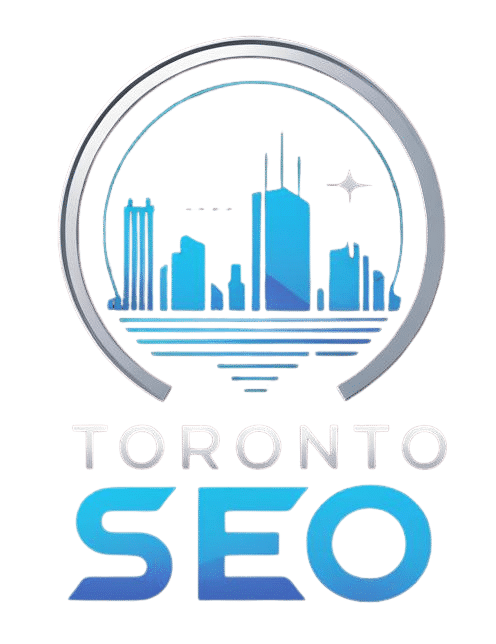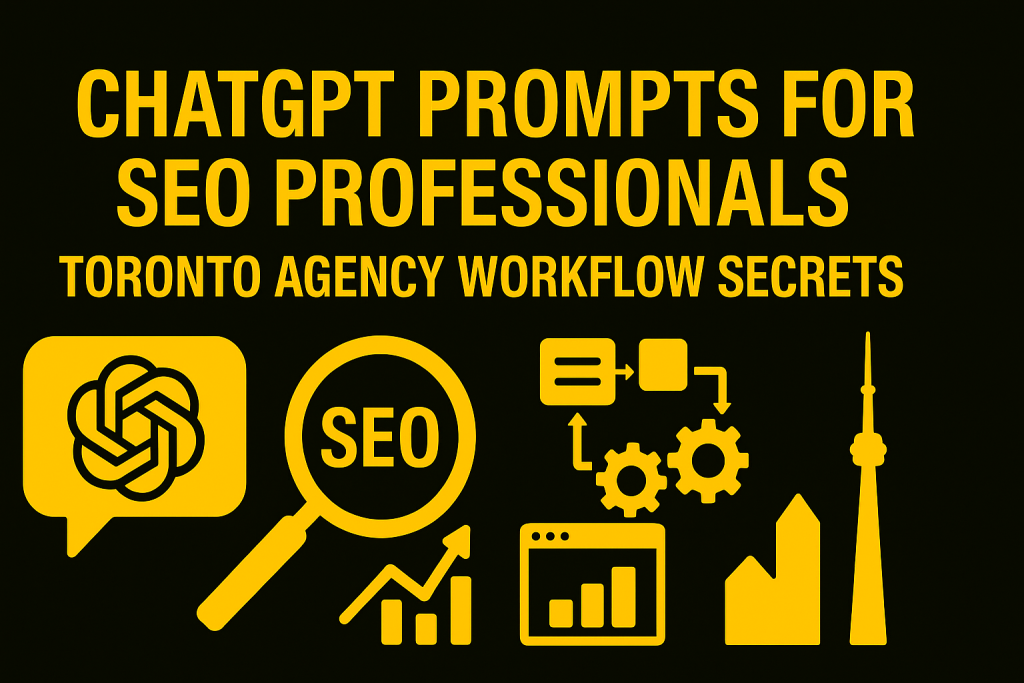In 2025, SEO agencies in Toronto are redefining productivity through AI-powered workflow automation. From keyword research and content creation to client reporting, ChatGPT prompts are becoming the backbone of smarter, faster, and more profitable SEO operations. In this comprehensive guide, we’ll uncover how leading Toronto SEO firms use AI to scale campaigns, build strategies, and outsmart competitors—with real, actionable prompt workflows that can revolutionize your own agency process.
The Rise of AI in Toronto’s SEO Agencies
Toronto’s competitive SEO market thrives on innovation. Agencies that once relied on manual keyword mapping and content calendars now use AI to generate precise, data-informed insights in seconds.
According to The Future of SEO in Toronto: Where Artificial Intelligence Meets Search Strategy, AI has become an indispensable layer in everything from technical audits to brand content optimization. This shift isn’t about replacing SEO professionals—it’s about amplifying their capabilities.
Top Toronto SEO firms combine prompt engineering and AI models like ChatGPT to streamline key tasks:
Generating content briefs with semantic keyword clustering
Producing client-ready reports that analyze competitors
Drafting Google Business Profile updates
Automating meta tag generation across hundreds of pages
This human + AI collaboration defines the modern SEO agency workflow in Toronto.
Building a Prompt-Driven SEO Workflow
1. Keyword Research: AI-Powered Topic Clusters
ChatGPT prompts can analyze hundreds of search terms and group them into intent-based keyword clusters, saving hours of manual categorization.
Example Prompt:
“Cluster these Toronto-related keywords by search intent and suggest pillar and supporting blog topics for each.”
Agencies use this technique alongside AI tools like Google Trends and SurferSEO to structure entire content calendars. This mirrors the approach discussed in Toronto Marketing Agencies Are Winning with AI-Driven Keyword Clustering in 2025, where clustering leads to better topical authority and faster rankings.
2. Content Creation: AI-Optimized Drafts that Rank
Once clusters are built, ChatGPT can generate high-quality, keyword-optimized content outlines.
A sample workflow includes:
Generating SEO briefs with headings, target phrases, and internal link placement
Using prompts to draft introductions and CTAs tailored for Toronto audiences
Editing tone and readability for brand consistency
By combining AI suggestions with insights from Google’s Helpful Content Guidelines, agencies ensure every post is optimized for both readers and search engines.
For example, in AI Content Optimization: Smarter Blog Writing for Toronto Companies, the use of ChatGPT’s context-driven prompt sequences helped agencies increase dwell time by 27%.
3. Technical SEO Audits and Site Optimization
Prompts can even accelerate technical SEO audits. By feeding ChatGPT structured data like crawl errors or Core Web Vitals metrics, professionals can generate actionable audit summaries and client-ready explanations.
Example Prompt:
“Analyze this Core Web Vitals report for a Toronto ecommerce site and recommend five actionable improvements.”
This ties directly to insights shared in Core Web Vitals Toronto: Real Fixes That Boost Ranking, where automation has replaced manual reporting in over 60% of agencies.
4. On-Page Optimization and Schema Automation
Using structured prompts, agencies can automate meta title creation, schema markup generation, and keyword density checks.
For instance:
“Generate schema markup for a local Toronto SEO service page that includes reviews, service type, and price range.”
This workflow ensures compliance with Google’s structured data policies, often cross-referenced with Google Developers’ Schema Guidelines.
The result: faster implementation and higher CTRs on local pages.
5. Competitor Analysis and SEO Reporting
Gone are the days of manually creating client reports. ChatGPT can analyze Ahrefs or SEMrush exports and summarize insights for presentation.
Prompt Example:
“Summarize this backlink report and highlight three competitor strategies we can outperform.”
This technique aligns with the strategies shared in Behind the Scenes: How Toronto SEO Experts Build Winning Strategies, emphasizing data storytelling as the new form of SEO consulting.

Real Agency Workflows: Toronto SEO Firms and ChatGPT in Action
Workflow 1: Content Brief Generator for Local SEO
Tools Used: ChatGPT, Google Sheets, Ahrefs
Goal: Speed up topic ideation for location pages
Process:
Upload keywords related to “Toronto plumbers”
Use ChatGPT to generate content outline suggestions for each cluster
Export briefs to Google Docs for copywriters
This workflow reduces time spent per project by 45%, ensuring scalability for agencies managing dozens of clients.
Workflow 2: Automated Client Reporting
Tools Used: ChatGPT, Google Data Studio, Zapier
Prompt Sample:
“Write a concise client summary using this data: keyword gains, CTR improvements, and traffic growth.”
Reports become conversational and tailored—giving clients the humanized AI touch Toronto agencies are known for.
Workflow 3: AI-Assisted Link-Building Outreach
Prompt Sample:
“Write a personalized outreach email for a Toronto business directory, including the value proposition of listing our client’s services.”
Combined with strategies from How Toronto SEO Agencies Build High Authority Backlinks Without Guest Posting, this method achieves higher open rates and genuine backlink placements.
Prompt Engineering: The Secret Weapon of SEO Firms
Toronto agencies that dominate Google rankings in 2025 are those mastering prompt engineering—the art of writing context-rich, layered prompts that guide AI output.
In Why Prompt Engineering Is the Secret Weapon for SEO Firms in Toronto, experts describe how structured prompt sequences produce brand-aligned, SEO-ready copy without endless revisions.
Agencies now maintain internal “prompt libraries” categorized by:
Blog content generation
Meta tag writing
Competitor summaries
Social caption ideation
Local listing optimization
Integrating ChatGPT Prompts into a Toronto Agency Stack
Step 1: Identify Repetitive SEO Tasks
List out manual workflows—such as writing alt text, optimizing internal links, or summarizing client KPIs.
Step 2: Create Modular Prompt Templates
Develop prompts for each repetitive task. Test them with multiple AI models.
Step 3: Integrate with Existing Tools
Connect ChatGPT with Google Sheets or Trello for automation. Many Toronto agencies use Zapier to trigger AI content drafts based on new keyword uploads.
Step 4: Maintain Human Oversight
While automation boosts speed, human editing ensures tone, accuracy, and compliance with brand standards.
Why Toronto Agencies Lead in AI-Driven SEO
Toronto’s SEO landscape is unique—highly competitive, multilingual, and tech-forward. Agencies here were among the first in Canada to integrate machine learning with SEO strategy.
As shared in AI SEO Toronto: Leveraging Machine Learning for Smarter Keyword Targeting, these firms use AI not just to optimize rankings, but to forecast traffic trends and adapt to Google’s AI-driven algorithm updates.
Ethical Use and Data Privacy
AI integration must follow ethical and transparent practices. Toronto agencies adhere to both Government of Canada’s AI and Data Ethics Guidelines and Google’s privacy framework.
This ensures data protection, client confidentiality, and compliance—critical pillars of trust in AI-powered SEO.
The Future of AI SEO Prompts in Toronto
By 2026, ChatGPT-like models will likely be natively embedded into SEO platforms. Content strategists won’t just use prompts—they’ll design adaptive AI “playbooks” that evolve with search data in real-time.
Toronto agencies already experimenting with predictive SEO and AI-driven content audits are setting the standard for North American digital marketing.
For businesses seeking a competitive edge, collaborating with an AI-driven SEO agency is no longer optional—it’s essential.
Frequently Asked Questions (FAQs)
1. How can ChatGPT improve keyword research for SEO professionals?
It automates clustering, identifies semantic relationships, and provides content ideas that align with user intent—cutting research time in half.
2. Are AI-generated SEO reports accurate?
Yes, when based on verified data sources (e.g., Google Search Console exports), ChatGPT can summarize and visualize trends accurately for client reports.
3. Can ChatGPT generate SEO-optimized blog posts?
Yes, when prompts include structured keyword targets, tone, and internal linking suggestions. Human editing refines the final output.
4. How do Toronto SEO agencies use ChatGPT differently?
They customize prompts around local search behavior, industry niches, and multilingual contexts (English, French, Mandarin), making AI outputs locally relevant.
5. Is AI replacing SEO professionals?
No—AI enhances productivity. Professionals focus more on strategy, analysis, and relationship-building while AI handles repetitive optimization tasks.
Final Thoughts
ChatGPT prompts are not just productivity boosters—they’re strategic levers that help Toronto SEO agencies outperform competitors and deliver measurable client ROI.
Businesses that adopt this AI-first mindset today will lead the next evolution of digital marketing tomorrow.
For professional consultation or to integrate AI-powered SEO strategies into your campaigns, contact TorontoSEO.com today.


